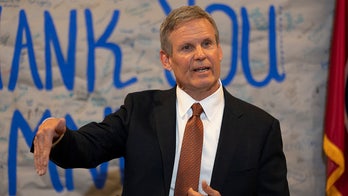The Republican National Committee just released this statement in reaction to Obama's Iraq comments in Fargo, N.D. The statement comes from RNC spokesman Alex Conant.
“There appears to be no issue that Barack Obama is not willing to reverse himself on for the sake of political expedience. Obama’s Iraq problem undermines the central premise of his candidacy and shows him to be a typical politician.”
The Bourbon Room sent Obama's full answer to Michael O'Hanlon, a senior fellow at the Brookings Institution and specialist in Iraq policy, to ask if he thought Obama flip-flopped on Iraq or was at least trying to create more flexibility in his approach to timelines for troop withdrawals.
O'Hanlon kindly wrote back as follows:
"The second question was good, (please see the post below on Obama's Iraq remarks). It forced him back to the 1-2 brigades per month formulation and the 16 month (troop withdrawal) timeline. He didn't quite modify it but he certainly didn't reinforce it. And his emphasis on Iraqi stability as a guiding criterion is important and would seem to open the door more--to an extent, anyway."
O'Hanlon, in pre-taped interview with me earlier today, described Obama's Iraq position as "ambiguous" because it defined a hard and measurable goal of withdrawing virtually all U.S. combat brigades within 16 months while at the same time saying Obama would consult with generals on the ground in Iraq for their opinion.
O'Hanlon told me these were positions at odds with one another because he said no general in Iraq now believes all combat brigades can be removed that rapidly without a sizable lose of stability in Iraq and without risking a possible resurgence of Al Qaeda activity or insurgent-fed violence.
When O'Hanlon -- who told me he would welcome a modified Obama policy on Iraq -- wrote that Obama appeared to "open the door more -- to an extent anyway" he was saying Obama was intentionally creating policy wriggle room to manuever on the question of hard troop withdrawal timelines.
In essence, O'Hanlon would not call it a flip-flop but a path to a possible evolution, one he predicted would inflict short-term political pain but might win Obama support from those fearful of a rigid Iraq policy indifferent to success on the ground.




